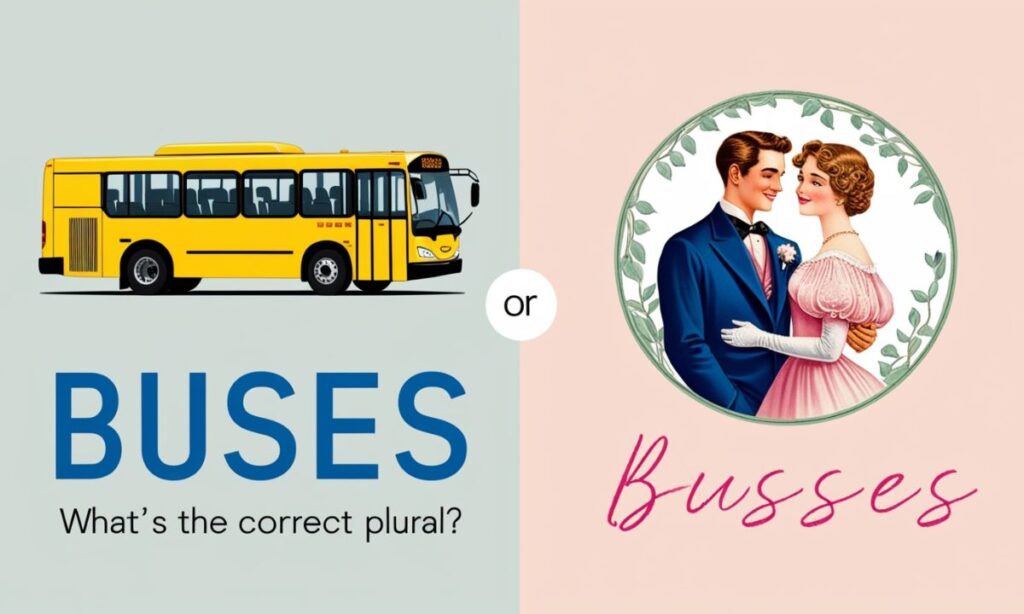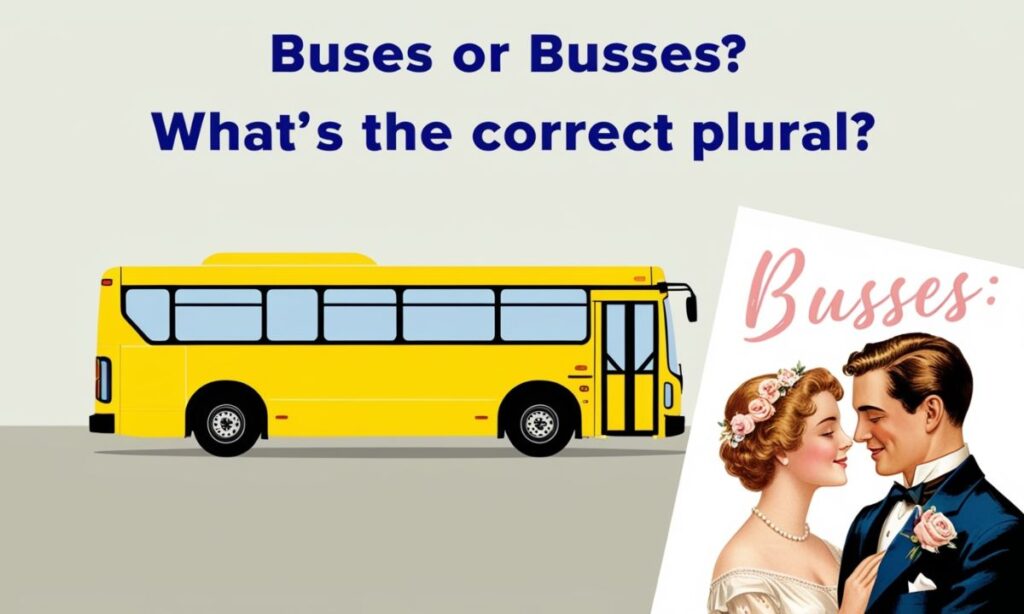The word buses is the right plural form when talking about vehicles that carry people. It is the form you see in schools, cities, and books. Writers and teachers agree that this is the correct choice for modern English.
The spelling busses has another meaning. It comes from an old word that means kisses. This word is not often used today, except in poems or old stories. For transport, you should always use the other spelling to avoid mistakes.
The history of the word comes from omnibus, a Latin word that means “for all.” Over time, the long word became shorter. That is why buses is accepted now. Knowing this simple rule makes writing easier and more clear.
What Does “Bus” Really Mean?
A bus is a big vehicle that carries many people together. It is used in cities, schools, and towns to help children and adults travel safely. This transport saves time and makes moving from one place to another much easier.
The word bus is also used in computers. In technology, it means a path that helps move data between parts of a machine. This shows the word can describe both public travel and important systems in modern devices.
Buses or Busses: The Short Answer
The correct spelling for more than one bus is buses. This form is used in books, schools, and everyday writing. It is the choice accepted in both American and British English for transportation and is the safest spelling to remember.
The spelling busses has a different meaning. It comes from an old word that means kisses. This word is not linked to vehicles. It is mostly seen in poems or very old stories, not in daily writing about travel.
Writers, teachers, and style guides all agree that buses is the correct form. Using the right word makes your writing clear. When speaking or writing about vehicles, this spelling will always be the correct and trusted option.
| Word | Plural Form | Usage Example |
|---|---|---|
| Bus | Buses | “Three city buses pulled into the terminal.” |
| Buss | Busses | “The old woman gave her grandson two busses on the cheek.” |
See More : 20 Unique Phrases Instead of Good Luck in Future Endeavors
Why Is There Confusion Between Buses and Busses?

The mix-up between buses and busses happens because English spelling rules can be tricky. Many words ending with “s,” “sh,” or “x” take “es” in the plural, such as boxes, dishes, or kisses. This makes people think bus should follow the same idea.
Over time, language rules changed. Dictionaries and style guides now show buses as the accepted spelling for vehicles. The other form is very old and is not used for transport. This clear rule helps writers make fewer mistakes in school and daily life.
The spelling busses stayed in English only because it also means kisses. That meaning comes from older times and is not linked to travel. When speaking or writing about transport, always use the other form to keep your work correct.
Understanding the Origins: Bus Etymology
The word bus comes from the Latin word omnibus, which means “for all.” Long ago, this name was used for public vehicles that anyone could ride. Over time, the longer word was shortened, and people began using the shorter form.
The spelling busses has no link to vehicles. It comes from another old English word that means kisses. Knowing this difference makes it easier to choose the right spelling. The history shows clearly why only one form is correct for transport.
| Term | Origin | Meaning |
|---|---|---|
| Omnibus | Latin | “For all” |
| Bus | 1830s, English | Short form of “omnibus” |
| Buss | Middle English | To kiss (no link to vehicles) |
Bus vs Busses in Real-Life Scenarios
In real life, bus is always written as buses when talking about vehicles, like school or city transport. The word busses is only used in old writing to mean kisses. Using the correct form helps make sentences clear and easy to read.
- A city worker writes, “The buses arrived late because of traffic.” (vehicles)
- A teacher says, “Two yellow buses carried students to school.” (transport)
- An old poem reads, “She gave him gentle busses on the cheek.” (kisses)
- A storybook line says, “The grandmother gave two sweet busses before bedtime.” (old use)
Grammar Rules for Words Like “Bus”
English has many rules for plurals, and the word bus is a good example. Most words ending in “s,” “sh,” or “x” add “es,” like boxes or dishes. But the correct form for this vehicle is buses, which every dictionary accepts today.
| Singular | Plural | Rule |
|---|---|---|
| Bus | Buses | Exception to -s rule |
| Kiss | Kisses | Add -es |
| Box | Boxes | Add -es |
| Dish | Dishes | Add -es |
| Gas | Gases | Add -es (note vowel) |
How to Avoid Confusion
To stay clear, always use buses when writing about vehicles for travel. This choice is correct in schools, books, and news. The spelling is simple to remember and keeps your sentences right, so readers understand exactly what you mean.
The word busses belongs only to old writing that means kisses. It should not be used for transport. Checking a good dictionary or style guide helps you learn the difference. With this habit, your writing will always stay correct.
- Always use buses for vehicles.
- Remember busses only means kisses in old writing.
- Check a dictionary if you are unsure.
- Follow teacher or style guide advice.
- Use spelling tools to keep words correct.
Common Synonyms and Alternatives for “Bus”

There are many words that can replace bus depending on use. A long trip may use the word coach, while a small vehicle is called a minibus. For short rides, people say shuttle, and a rented vehicle is often called a charter.
- Coach – used for long trips, often more comfortable.
- Minibus – a smaller vehicle that carries fewer people.
- Shuttle – makes short rides, like from an airport.
- Charter – a vehicle rented for special travel.
- Transit vehicle – a general name for public transport.
Real Usage Across the English Language
In daily writing, the word buses is used for travel and transport. Sentences like “The school buses arrived on time” are common in news and classrooms. This spelling is clear, simple, and trusted by teachers, writers, and style guides everywhere.
The word busses appears less often. It is mainly seen in poems or older books where it means kisses. This older form is not connected to vehicles. Knowing the difference helps students write correctly in both schoolwork and everyday notes.
| Sentence | Explanation |
|---|---|
| “The buses were delayed due to snow.” | Standard usage in transportation |
| “She gave him gentle busses on the forehead.” | Literary/archaic term meaning kisses |
| “The bus fleet includes electric buses.” | Consistent with modern public systems |
See More : NYT Connections Puzzle Help: Hints & Answers Today
Final Thoughts
The correct form for more than one bus is always buses. This spelling is simple, modern, and clear for everyone to understand. It is the choice used in schools, books, and daily life whenever we talk about transport or travel.
The spelling busses has a very different meaning. It belongs to older English and is linked only to kisses in poems or stories. By learning this rule, students can avoid mistakes and write with confidence in every subject.

Join Bibcia on a journey to master English grammar. Discover easy lessons, writing tips, and practical examples designed to make learning grammar simple and effective.










